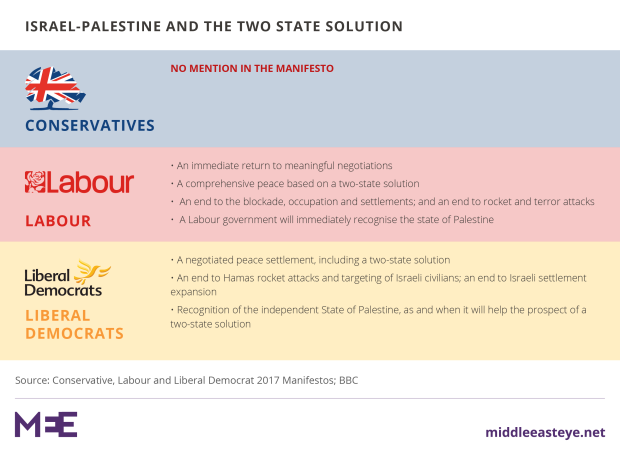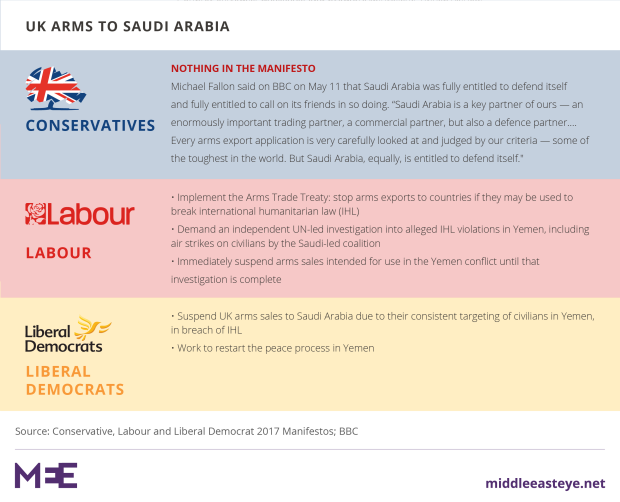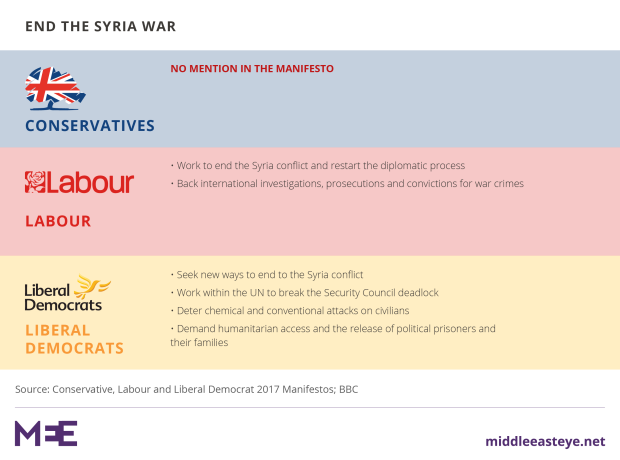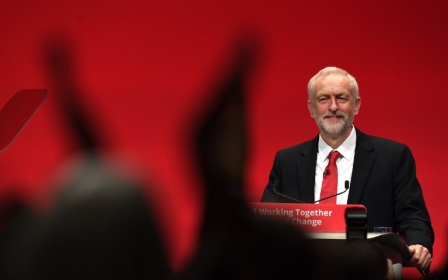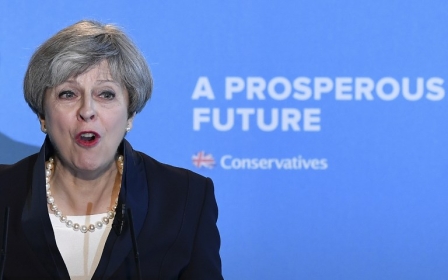Oborne: Corbyn's election manifesto for the Middle East is radical and morally courageous
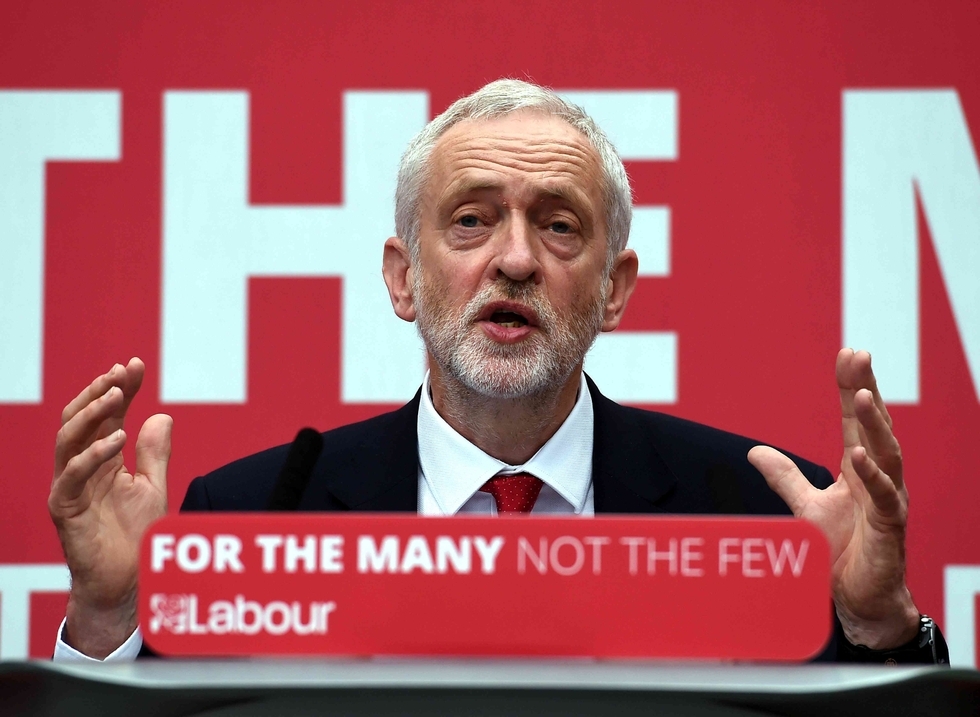
It is more than 20 years since the emergence of Tony Blair as Labour leader in the early 1990s led to the deliberate eradication of genuine, substantial difference between Britain’s two main political parties.
Labour under Blair and the Conservatives under David Cameron shared identical policies. They both wanted to "marketise" the public sector. They had fundamentally the same views on taxation and spending.
Corbyn is offering a serious alternative to the catastrophic system of cross-party politics which gave the world the Iraq, Afghan and Libyan calamities
Foreign policy on both sides was literally identical. The leadership of both Labour and the Conservatives backed the wars in Iraq, Libya and Afghanistan, the alliance with Saudi Arabia and the Sunni states in the Gulf.
London did what it was told by Washington.
This was terrible for democracy, but very few politicians minded. Under the Blair-Cameron system parties belonged to hugely rich donors. Activists were viewed with contempt and hostility.
This was the situation under Blair, his Labour successor Gordon Brown and then Cameron. Nick Clegg ended up destroying his own Liberal Democrat party by embracing this anti-democratic politics when he joined Cameron's coalition government as a junior partner between 2010 and 2015.
This cross-party consensus has been smashed, thanks to Jeremy Corbyn, the current Labour leader. Whatever one thinks of Corbyn's political views (and I disagree with many of them), British democracy owes him a colossal debt of gratitude for restoring genuine political debate to Britain.And of course his extremely brave and radical decision to break with the foreign policy analysis of Blair and his successors explains why he is viewed with such hatred and contempt across so much of the media and within the Westminster political establishment.
Let's now look at Corbyn's foreign policy in light of the publication this week of the parties' manifestos ahead of the country's 8 June general election.
Contrary to what one reads in the newspapers or hears on television, his manifesto is a well-argued and coherent critique of the foreign policy consensus which has done so much damage over the last quarter of a century.
He is offering a serious alternative to the catastrophic system of cross-party politics that gave the world the Iraq, Afghan and Libyan calamities.
His manifesto pledges to "commit to working through the UN" and to "end support for unilateral aggressive wars of intervention".
We have been waiting to hear a mainstream British politician say this for years, and at last Corbyn (supported by his capable foreign affairs spokesperson Emily Thornberry) has spoken out against the pattern of illegal intervention favoured by the United States and its allies.
Needless to say, the British media (and in particular the BBC, which has a constitutional duty to ensure fair play during general elections) has practically ignored Corbyn's foreign policy manifesto.Corbyn has also had the moral courage to highlight the predicament of the Chagos Islanders, supporting their right to "return to their homelands".
Corbyn bravely but correctly compares the British betrayal of the Chagossians – deprived of their Indian Ocean home as a result of a squalid deal between Britain and the US in the 1960s – with our national loyalty to the Falkland Islands, the South Atlantic territory that Britain sent a taskforce to recapture following an Argentinian invasion in 1982.
The Conservatives' manifesto contains no specific foreign policy pledges and no mention of Saudi Arabia, Yemen, Palestine or the Middle East at all
Corbyn is also brave on the Middle East. He promises to implement the will of parliament in a famous vote three years ago and recognise the state of Palestine.
I met a British ambassador to an Arab state several months after that parliamentary vote (to his credit, supported by then-Labour leader Ed Miliband).
The ambassador told me of his disgust that Cameron had not lifted a finger to implement the will of the British parliament.
Indeed, so he said, the matter had not even been raised when Middle Eastern and North African envoys met for one of their regular summits in the aftermath of the vote. That shows how total is the contempt felt by the British foreign policy establishment for parliamentary democracy.
Arguably even more brave, Corbyn will demand "comprehensive, independent, UN-led investigations into alleged violations of international humanitarian law in Yemen, including air strikes by the Saudi-led coalition".
Corbyn will also "suspend any further arms sales for use in the conflict until that investigation is concluded".
The Labour position here is admirable. Under Cameron, and now Theresa May, Britain has thrown its weight behind the Saudi bombing campaign.
I am afraid that Michael Fallon, who has proved a lightweight defence secretary, recently said that the murderous Saudi bombing raids have been carried out in "self-defence".
I am afraid his approach is sadly typical of the series of misstatements and lies emanating from the British government over this terrible Yemen business.
Once again, well done to Corbyn for confronting the May government’s cynical and callous approach to Saudi Arabia and Yemen.
By contrast, the Conservatives' manifesto contains no specific foreign policy pledges and no mention of Saudi Arabia, Yemen, Palestine or the Middle East at all.
But it is deeply upsetting that the BBC has betrayed its own rules of impartiality and ignored Corbyn’s brave stand on this issue.As Mark Curtis has pointed out in a brilliant article, the BBC website carried only 10 articles on Yemen but 97 on Syria in the six weeks to 15 May "focusing on the crimes of an official enemy rather than our own".
Jeremy Corbyn has his weaknesses as leader. But this week he has raised matters of deep importance that go right to the heart of Britain's role in the world, and in particular the Middle East.
Yet his radical and brave manifesto is being traduced, misrepresented, and ignored. That is wrong – and a betrayal of British democracy.
- Peter Oborne was named freelancer of the year 2016 by the Online Media Awards for an article he wrote for Middle East Eye. He was British Press Awards Columnist of the Year 2013. He resigned as chief political columnist of the Daily Telegraph in 2015. His books include The Triumph of the Political Class, The Rise of Political Lying, and Why the West is Wrong about Nuclear Iran.
The views expressed in this article belong to the author and do not necessarily reflect the editorial policy of Middle East Eye.
Photo: Jeremy Corbyn launches the Labour election manifesto in Bradford, northern England on 16 May (AFP)
New MEE newsletter: Jerusalem Dispatch
Sign up to get the latest insights and analysis on Israel-Palestine, alongside Turkey Unpacked and other MEE newsletters
Middle East Eye delivers independent and unrivalled coverage and analysis of the Middle East, North Africa and beyond. To learn more about republishing this content and the associated fees, please fill out this form. More about MEE can be found here.



